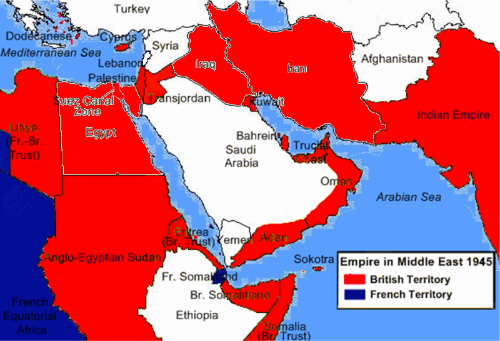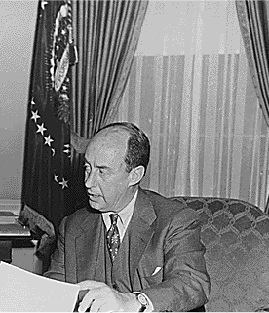Good news, everyone. The much-talked-about Middle East update has finally arrived. The Middle East is very much a complicated place, and trying to put an alternate history spin on it is also complicated. I really appreciate the feedback you all have been giving me here and elsewhere.
------------------------------------------------------------------------------------
Sparkman’s Trip
In the summer of 1953, Stevenson turned his attention to an area of foreign policy that he considered to be “a minefield”: the Middle East. The “minefield” label was certainly appropriate. Ever since the end of World War Two, the region had been anything but peaceful. Violent outbreaks between the Arab population and Jewish settlers had forced the British to withdraw from Palestine and hand the problem over to the United Nations. The United Nation’s decision to partition Palestine into side-by-side Arab and Jewish states further undermined security in the region. When Israel came into existence on February 14th, 1950, the Dewey Administration stepped in and helped safeguard her independence from her hostile Arab neighbors. This in turn fueled anti-American anger among the Arab states. Three years after Israel’s birth, Stevenson thought the time had come to re-evaluate the Middle East and see if he could chart a new course away from Dewey’s Israel-only policy. As with Vietnam, the President wanted to have a fact-finding mission to the region before making any decisions. He chose to assign the mission to his Vice President (who was anxious to have some sort of role within the Administration and therefore gladly agreed to make this trip).
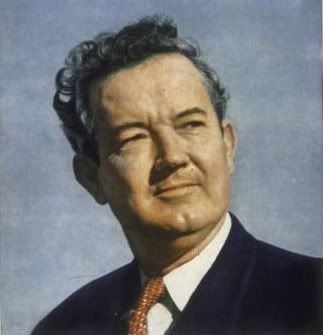
It must have been quite a culture shock for the people of the Middle East when Sparkman arrived in Dhahran, Saudi Arabia on June 24th. Stepping off the plane, the Vice President greeted the United States Ambassador there and the Arabian crowd with his Deep South voice. For many people, this was the first time they had ever heard this uniquely American accent. Visiting the largest Arab country for the first time, Sparkman learned real quickly that the nation was built on one essential resource: oil. “This place is basically one giant gas station,” he quipped during his visit. The Vice President also learned who ran the country: the royal House of Saud. Upon meeting King Abdul Aziz al Saud, Sparkman was struck by how old-looking but impressive he was. The two men discussed at length politics. The King expressed his dislike that the United States was supporting Israel – something Sparkman would hear more than once during the tour. However, Israel was minor compared to a more pressing problem: the British. None of the Saudis were happy with British interference in the region and wanted America to exert her influence in forcing them out. Sparkman said he couldn’t promise anything without consulting the President first. “The United States,” the King reminded his guest, “Opposed imperialism in the past and helped win independence for our neighbors. We appreciate your help in preventing the French from re-occupying Syria and Lebanon during the war. By once again standing against the remnants of imperialism, the United States will do much to redeem herself in the hearts of Arabians everywhere.”

After being given a vast oriental rug as a parting gift, the Vice President next traveled to Cairo, Egypt. Unlike the Saudis, the Egyptians pulled out all the stops in welcoming the American visitor to their country. They wanted to make a grand first impression – and it worked. As Sparkman would report later, the Egyptians “went above and beyond in being gracious hosts.”
This warm welcome was all carefully choreographed, of course. The Egyptian Government, headed by Colonel Muhammad Naguib, was perhaps the least corrupt, most forward-looking of the Arabian states and saw the United States as a friend and not a foe. Yes, Egypt opposed Israel and tried to wipe her off the map in the 1950 Arab-Israeli War…but that was all before Naguib came to power. The Egyptian President believed his country should look past Israel and build a strong relationship with the United States.
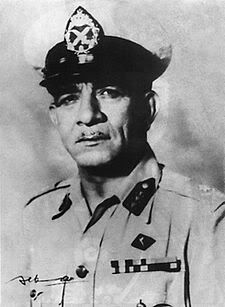
One of the factors driving the Egyptian good attitude towards the Americans was the desire for their aid in a construction project that was on the drawing board at the time. To increase economic production by regulating the annual flooding of the Nile River and providing storage of water for agriculture, the Egyptians wanted to build a second dam in Aswan (the first dam had been constructed at the turn of the 20th Century). The “High Dam” was planned to be 3,830 meters long and 111 meters high and would increase Egypt’s arable acreage by about one-third. The Vice President told Naguib that “I see my nation’s support for the development of your dam as quite possible.”
Encouraged by the prospect of American financing of the High Dam project, Naguib asked for US support on something else: ending British control of the Suez Canal. Opened in 1869, the Suez Canal is an artificial sea-level waterway connecting the Mediterranean Sea with the Red Sea. It allows for easy transport between Europe and Asia without having to go all the way around Africa. Regarding the Suez Canal to be a matter of sovereignty, Naguib requested that America exert pressure on the British to withdraw and hand the canal over to them. As in Saudi Arabia, the former Alabamian Senator dodged the request by stating that he was in no position to say “Yes” or “No” on the matter:
“Construction projects are one thing. Foreign policy is something else.”
Content with the prospect of obtaining funding for the dam, the modest and soft-spoken Naguib dropped the Suez Canal issue – for the moment, anyway.
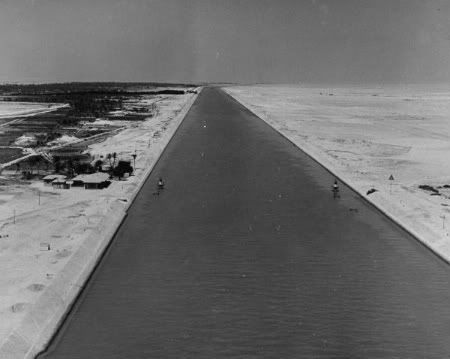
After sightseeing the ancient Pyramids, Sparkman left Egypt. His feeling at the time of departure was that the country could develop into a strong ally of America. However, he couldn’t completely push the Suez Canal issue aside. The British were deeply rooted in Suez and it seemed unlikely that the Eden Government would just abandon it. Sparkman knew that at some point, the United States would have to either side with Egypt or with the United Kingdom. In any event, this would be down the road. In the meantime, the Vice President’s next stop would be Beirut, Lebanon. The Lebanese reception was cold, with no warmth at all. Of all the Middle Eastern countries, Lebanon detested the United States the most…and the Vice President felt this throughout his stay. Anti-Israeli emotion on the streets ran very high, which spilled over into anti-American anger. At one point while in Beirut, Sparkman found himself dodging an egg thrown at him by a protestor. In his meeting with President Camille Chamoun, Sparkman was told point-blankly that nothing less than full American withdrawal of support for Israel would improve diplomatic relations between their two nations.

Getting nowhere in Lebanon, Sparkman and his entourage quickly went overland across the border to Damascus, Syria. Here, the Syrians were somewhat better than the Lebanese. Unlike Lebanon, Syria didn’t believe in “throwing Israel into the sea.”
The Syrians accepted that the Israelis were here to stay. What they wanted from America was help in dealing with repatriating the Arab refugees, fixing boundaries, and pushing the United Nations to internationalize Jerusalem. After agreeing to discuss the matter with the President, Sparkman flew to Amman, Jordan – where he posed for a photo-op with His Majesty Hussein I.
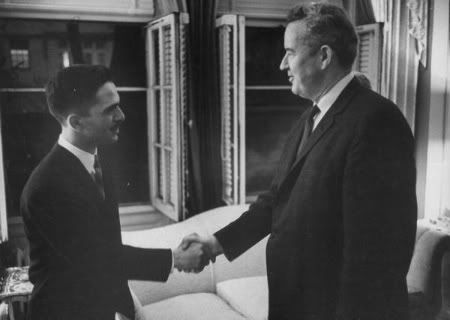
The Vice President concluded his Middle East tour in Israel. In their meeting, Prime Minister David Ben Gurion laid out his nation’s goals:
-Fulfilling her humanitarian mission of providing shelter and sanctuary for her homeless Jewish refugees
-Rebuilding the desert land of Israel
-Pursuing economic development based on Hebrew ethics and modern technology
“It can be done because it has to be done,” Gurion declared, “Our survival as Jewish people depend on it.”
Sparkman reassured Gurion that the United States would continue assisting Israel; at the same time, he warned that the Administration was considering changes in Middle East foreign policy:
“We would like the focus to be less about Israel and more about the region as a whole. We would like to encourage your country and the Arab States to settle your differences by direct negotiation.”
That's when the meeting turned tense. Somewhat offended, Gurion argued that Israel wanted to live in “friendly cooperation” with her Arab neighbors. However, the Arabs chose to make war against her. “Our aim is peace,” he said. For peace to succeed, the Arabs had to stop trying to fight the Jews. Sparkman acknowledged that Arabs had been hostile, but “that is no reason why the United States should not try to understand the Arab point of view.”
When Gurion was informed that the Administration would consider aiding Egypt to help them develop their economic resources and raise their living standards, he was not a happy camper. He felt that in doing so, the United States would be essentially abandoning Israel. “With all due respect,” he said, “The previous Administration understood very well the precarious situation that we are in. I am afraid your Administration doesn’t understand that you simply cannot let us wither on the vine in favor of dealing with people whose only goal is to kill us.”
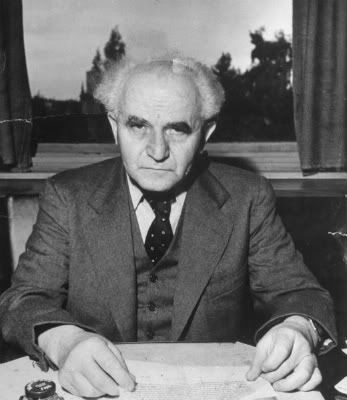
Sparkman left the meeting with a very low opinion of Gurion. He also felt that – like the ownership of the Suez Canal – the United States would have to make another tough choice: continue standing blindly behind Israel or reach out to the Arabs (with Egypt being the best bet). Leaving Israel, he made a brief layover in Cyprus before heading home to the United States. During his brief stay on the island, Sparkman could feel the heavy tension in the air. The ancient island was in the middle of a bitter territorial dispute between Greece and Turkey. After World War Two, the Attlee Government gave into the Greek Government’s demand to hand Cyprus over to them. Turkey – who also laid claim to the island – refused to recognize Greek sovereignty, arguing that Cyprus really belonged to them. As a result, Greece and Turkey were at odds with each other over the legal status of the island. Discussing the matter with the Cypriots, Sparkman could sense the nervousness among the people living on the island that this territorial dispute could spiral into all-out war if the two sides pushed things that far. Greek and Turkish Cypriots both wanted American support in their competing claims to the island. As the Vice President finally made his way home, there was no doubt that there would be a lot to talk about at the White House – along with tough decisions that would have to be made regarding the Middle East and Cyprus.
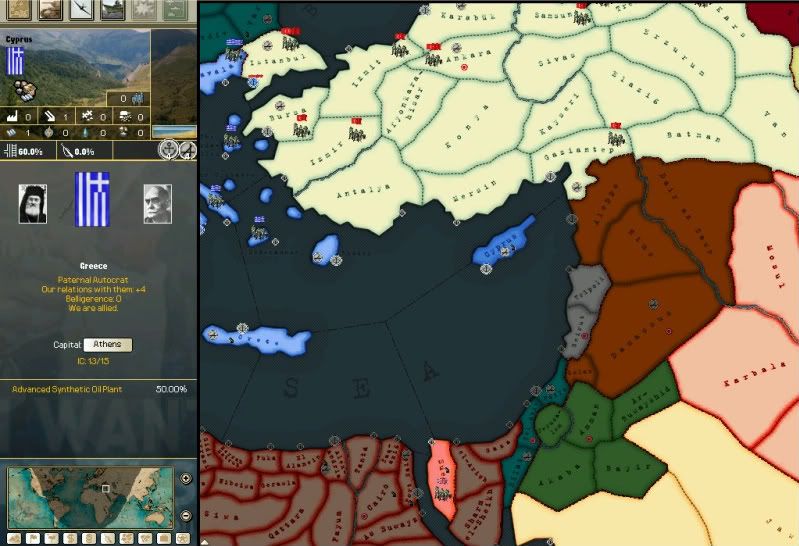
------------------------------------------------------------------------------------
Sparkman’s Trip
In the summer of 1953, Stevenson turned his attention to an area of foreign policy that he considered to be “a minefield”: the Middle East. The “minefield” label was certainly appropriate. Ever since the end of World War Two, the region had been anything but peaceful. Violent outbreaks between the Arab population and Jewish settlers had forced the British to withdraw from Palestine and hand the problem over to the United Nations. The United Nation’s decision to partition Palestine into side-by-side Arab and Jewish states further undermined security in the region. When Israel came into existence on February 14th, 1950, the Dewey Administration stepped in and helped safeguard her independence from her hostile Arab neighbors. This in turn fueled anti-American anger among the Arab states. Three years after Israel’s birth, Stevenson thought the time had come to re-evaluate the Middle East and see if he could chart a new course away from Dewey’s Israel-only policy. As with Vietnam, the President wanted to have a fact-finding mission to the region before making any decisions. He chose to assign the mission to his Vice President (who was anxious to have some sort of role within the Administration and therefore gladly agreed to make this trip).

It must have been quite a culture shock for the people of the Middle East when Sparkman arrived in Dhahran, Saudi Arabia on June 24th. Stepping off the plane, the Vice President greeted the United States Ambassador there and the Arabian crowd with his Deep South voice. For many people, this was the first time they had ever heard this uniquely American accent. Visiting the largest Arab country for the first time, Sparkman learned real quickly that the nation was built on one essential resource: oil. “This place is basically one giant gas station,” he quipped during his visit. The Vice President also learned who ran the country: the royal House of Saud. Upon meeting King Abdul Aziz al Saud, Sparkman was struck by how old-looking but impressive he was. The two men discussed at length politics. The King expressed his dislike that the United States was supporting Israel – something Sparkman would hear more than once during the tour. However, Israel was minor compared to a more pressing problem: the British. None of the Saudis were happy with British interference in the region and wanted America to exert her influence in forcing them out. Sparkman said he couldn’t promise anything without consulting the President first. “The United States,” the King reminded his guest, “Opposed imperialism in the past and helped win independence for our neighbors. We appreciate your help in preventing the French from re-occupying Syria and Lebanon during the war. By once again standing against the remnants of imperialism, the United States will do much to redeem herself in the hearts of Arabians everywhere.”

After being given a vast oriental rug as a parting gift, the Vice President next traveled to Cairo, Egypt. Unlike the Saudis, the Egyptians pulled out all the stops in welcoming the American visitor to their country. They wanted to make a grand first impression – and it worked. As Sparkman would report later, the Egyptians “went above and beyond in being gracious hosts.”
This warm welcome was all carefully choreographed, of course. The Egyptian Government, headed by Colonel Muhammad Naguib, was perhaps the least corrupt, most forward-looking of the Arabian states and saw the United States as a friend and not a foe. Yes, Egypt opposed Israel and tried to wipe her off the map in the 1950 Arab-Israeli War…but that was all before Naguib came to power. The Egyptian President believed his country should look past Israel and build a strong relationship with the United States.

One of the factors driving the Egyptian good attitude towards the Americans was the desire for their aid in a construction project that was on the drawing board at the time. To increase economic production by regulating the annual flooding of the Nile River and providing storage of water for agriculture, the Egyptians wanted to build a second dam in Aswan (the first dam had been constructed at the turn of the 20th Century). The “High Dam” was planned to be 3,830 meters long and 111 meters high and would increase Egypt’s arable acreage by about one-third. The Vice President told Naguib that “I see my nation’s support for the development of your dam as quite possible.”
Encouraged by the prospect of American financing of the High Dam project, Naguib asked for US support on something else: ending British control of the Suez Canal. Opened in 1869, the Suez Canal is an artificial sea-level waterway connecting the Mediterranean Sea with the Red Sea. It allows for easy transport between Europe and Asia without having to go all the way around Africa. Regarding the Suez Canal to be a matter of sovereignty, Naguib requested that America exert pressure on the British to withdraw and hand the canal over to them. As in Saudi Arabia, the former Alabamian Senator dodged the request by stating that he was in no position to say “Yes” or “No” on the matter:
“Construction projects are one thing. Foreign policy is something else.”
Content with the prospect of obtaining funding for the dam, the modest and soft-spoken Naguib dropped the Suez Canal issue – for the moment, anyway.

After sightseeing the ancient Pyramids, Sparkman left Egypt. His feeling at the time of departure was that the country could develop into a strong ally of America. However, he couldn’t completely push the Suez Canal issue aside. The British were deeply rooted in Suez and it seemed unlikely that the Eden Government would just abandon it. Sparkman knew that at some point, the United States would have to either side with Egypt or with the United Kingdom. In any event, this would be down the road. In the meantime, the Vice President’s next stop would be Beirut, Lebanon. The Lebanese reception was cold, with no warmth at all. Of all the Middle Eastern countries, Lebanon detested the United States the most…and the Vice President felt this throughout his stay. Anti-Israeli emotion on the streets ran very high, which spilled over into anti-American anger. At one point while in Beirut, Sparkman found himself dodging an egg thrown at him by a protestor. In his meeting with President Camille Chamoun, Sparkman was told point-blankly that nothing less than full American withdrawal of support for Israel would improve diplomatic relations between their two nations.

Getting nowhere in Lebanon, Sparkman and his entourage quickly went overland across the border to Damascus, Syria. Here, the Syrians were somewhat better than the Lebanese. Unlike Lebanon, Syria didn’t believe in “throwing Israel into the sea.”
The Syrians accepted that the Israelis were here to stay. What they wanted from America was help in dealing with repatriating the Arab refugees, fixing boundaries, and pushing the United Nations to internationalize Jerusalem. After agreeing to discuss the matter with the President, Sparkman flew to Amman, Jordan – where he posed for a photo-op with His Majesty Hussein I.

The Vice President concluded his Middle East tour in Israel. In their meeting, Prime Minister David Ben Gurion laid out his nation’s goals:
-Fulfilling her humanitarian mission of providing shelter and sanctuary for her homeless Jewish refugees
-Rebuilding the desert land of Israel
-Pursuing economic development based on Hebrew ethics and modern technology
“It can be done because it has to be done,” Gurion declared, “Our survival as Jewish people depend on it.”
Sparkman reassured Gurion that the United States would continue assisting Israel; at the same time, he warned that the Administration was considering changes in Middle East foreign policy:
“We would like the focus to be less about Israel and more about the region as a whole. We would like to encourage your country and the Arab States to settle your differences by direct negotiation.”
That's when the meeting turned tense. Somewhat offended, Gurion argued that Israel wanted to live in “friendly cooperation” with her Arab neighbors. However, the Arabs chose to make war against her. “Our aim is peace,” he said. For peace to succeed, the Arabs had to stop trying to fight the Jews. Sparkman acknowledged that Arabs had been hostile, but “that is no reason why the United States should not try to understand the Arab point of view.”
When Gurion was informed that the Administration would consider aiding Egypt to help them develop their economic resources and raise their living standards, he was not a happy camper. He felt that in doing so, the United States would be essentially abandoning Israel. “With all due respect,” he said, “The previous Administration understood very well the precarious situation that we are in. I am afraid your Administration doesn’t understand that you simply cannot let us wither on the vine in favor of dealing with people whose only goal is to kill us.”

Sparkman left the meeting with a very low opinion of Gurion. He also felt that – like the ownership of the Suez Canal – the United States would have to make another tough choice: continue standing blindly behind Israel or reach out to the Arabs (with Egypt being the best bet). Leaving Israel, he made a brief layover in Cyprus before heading home to the United States. During his brief stay on the island, Sparkman could feel the heavy tension in the air. The ancient island was in the middle of a bitter territorial dispute between Greece and Turkey. After World War Two, the Attlee Government gave into the Greek Government’s demand to hand Cyprus over to them. Turkey – who also laid claim to the island – refused to recognize Greek sovereignty, arguing that Cyprus really belonged to them. As a result, Greece and Turkey were at odds with each other over the legal status of the island. Discussing the matter with the Cypriots, Sparkman could sense the nervousness among the people living on the island that this territorial dispute could spiral into all-out war if the two sides pushed things that far. Greek and Turkish Cypriots both wanted American support in their competing claims to the island. As the Vice President finally made his way home, there was no doubt that there would be a lot to talk about at the White House – along with tough decisions that would have to be made regarding the Middle East and Cyprus.

Last edited:


